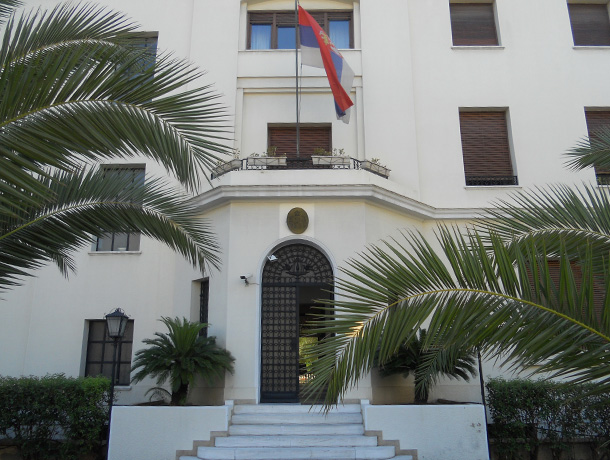Coffee with the Serbian Ambassador to Greece

Alexander Billinis
Greeks and Serbs have a special relationship. “We’re brothers,” goes the saying, but of course siblings often as not have no love for each other, yet my own experience, as a Greek-American married to a Serbian-American and having lived in both Greece and Serbia, has generally shown that there is indeed a bond reinforced by common cultural traits and common interests.
In March, I met the Serbian Ambassador to Greece, Dragan Zupanjevac, over coffee at Serbia’s elegant embassy on Vasilississ Sophias Avenue in Athens, not far from the US Embassy. After the initial introductions and some introductory attempts on my part in my perfectly functional yet flawed Serbian, we settled to English; the Serbian ambassador’s English was flawless, the result of years in New York and London, and the accent was equal parts London, New York, Belgrade.

Serbian Embassy Athens
Our discussion began on this special relationship, which the ambassador described as one of common experiences and “a common coincidence of interests.” He cited Palmerston’s famous quote that “nations have no permanent friends, but permanent interests.” In the diplomatic front, “Greeks were always very supportive and concerned about Serbia’s rights and interests, something I never will forget.”
Beyond the common experiences as allies in war and interests in common, the ambassador said “there is definitely chemistry between the two peoples.” People on the street, when meeting him, will say “we are brothers,” or something like that. On many occasions, particularly outside of Athens, the ambassador has been touched by the feelings of fellowship between the two Balkan Orthodox nations. He accompanied a Serbian theatre troupe to Kalamata, where there was standing room only in the hall, and the mayor welcomed the ambassador effusively as “oi monoi filoi—our only friends.” Greece has been a constant supporter for Serbia’s integration in the EU, for liberalization of the EU-Serbia visa regime, and is one of only five EU countries which refuse to recognize Kosovo. Cyprus also does not recognize the independence of Kosovo.
Beyond the sentimental and political side, there is a fair amount of business between the two countries. Greece is the second or third largest investor in Serbia (down from first place just a few years ago). “I tell people, if a Greek goes to Belgrade, he can go to a Greek bank, and stay at a Greek hotel, and shop at a Greek supermarket.” As for the financial sector, about one third of all Serbians’ deposits are in Greek banks, which are ubiquitous in every Serbian town. Much more can be done, but the infrastructure, and the interest, for stronger Greek-Serb trade relations are there.
“We send 800,000 or more tourists to Greece every year,” the ambassador commented, well over ten percent of Serbia’s population. Serbs prefer Greece over all other destinations, in part due to sentimental reasons, but also because there is much Serbian history in Greece, “unknown to most Greeks, unfortunately,” the ambassador added. Few Greeks know that over 100,000 Serbian soldiers were evacuated to Corfu during World War One, and that many Serbian officers took Greek wives home with them. Or that Serbs and Greeks fought side by side outside Salonika in World War I to vanquish the Bulgarian and German occupiers of Serbia and parts of Greece. “Greeks should learn about these important historical events, and ties between our peoples,” the ambassador added.
“By contrast, only 30,000 Greeks per year visit Serbia as tourists, and this should change,” the ambassador believes. Serbia has great historical sites relevant to Byzantine history, fantastic spas, some of which exist since Roman times, and in many ways the Serbian tourist offering is “complimentary to the Greek.” Reflecting on the current crisis, “Now, too, that Greeks have less money to spend, a city break to Belgrade or to the Exit Music Festival in Novi Sad (Europe’s largest) is far more economical than one to Paris or Rome.” There is much potential but the ambassador acknowledged that much more work needs to be done. Further, there is great opportunity for a more “Byzantine”-type tourist offering which would encompass both Greek and Serbian sites, particularly for the newly rich and curious Asian market.
I wanted to focus a bit on both countries’—and the region’s – common Byzantine culture. I mentioned my book, which I presented as a gift, which focused on the Byzantine heritage so often underappreciated, both by the West but even by those of us who are successors to this great culture. “Yes, so often Byzantium is perceived as negative, but during its time it was the highest civilization. We should be proud of our region, it is an amazing place, full of history and UNESCO cultural treasures. Many of them, in Kosovo, went up in flames in 2004.” Thirty five monasteries or churches destroyed, with priceless frescoes that prefigured the Renaissance. “People need to know about this,” the ambassador remarked pointedly. Few people actively promote the historical greatness of our Byzantine heritage even as the Turks pointedly promote their Ottoman past.
Switching again focus to our discussion, I asked about the role of the Diaspora in promoting and assisting the mother country, as both Greece and Serbia have large, involved Diasporas. “A big challenge is to attract Diaspora investments, beyond just money sent home to help relatives,” the ambassador commented. “No doubt corruption and red tape hinder this, but we are trying and we must try harder.” Stopping for a moment, he continued, “Why is it that a Serb in Vienna or Chicago is a hardworking success, but not necessarily in Serbia?” If anything, it seems as if a mentality needs to be imported more than capital. Greece’s Serbian community is quite small, and often intermarried with Greeks (as I know from personal experience) but nonetheless there are two Serbian grade schools in Crete, and two in Athens. “Diaspora affairs and assistance are a primary responsibility of the embassies.”.
Ambassador Zupanjevac is well known in Greece for his intrepid travel in the country, so I had to ask him, what part of Greece he preferred. “A hard question to answer.” Meteora and Santorini immediately came to mind, and the islands in general. Thinking for a moment, he said, “North of Corfu there is the island of Othoni, a small place with three restaurants. There is a church on the island where a local resident told me about a Serbian monument. I made my way up the hill to the church, and there was a faded stone monument with the inscription, ‘Here lie nine Serbian heroes,’ they died of wounds or illness after their evacuation from the front in southern Serbia and were entombed here, on Greek soil.” Here he fell silent, for a moment. So did I.
Alexander Billinis is a writer and banker currently living in Serbia. His book “The Eagle has Two Faces: Journeys through Byzantine Europe,” is available on amazon.com











0 comments